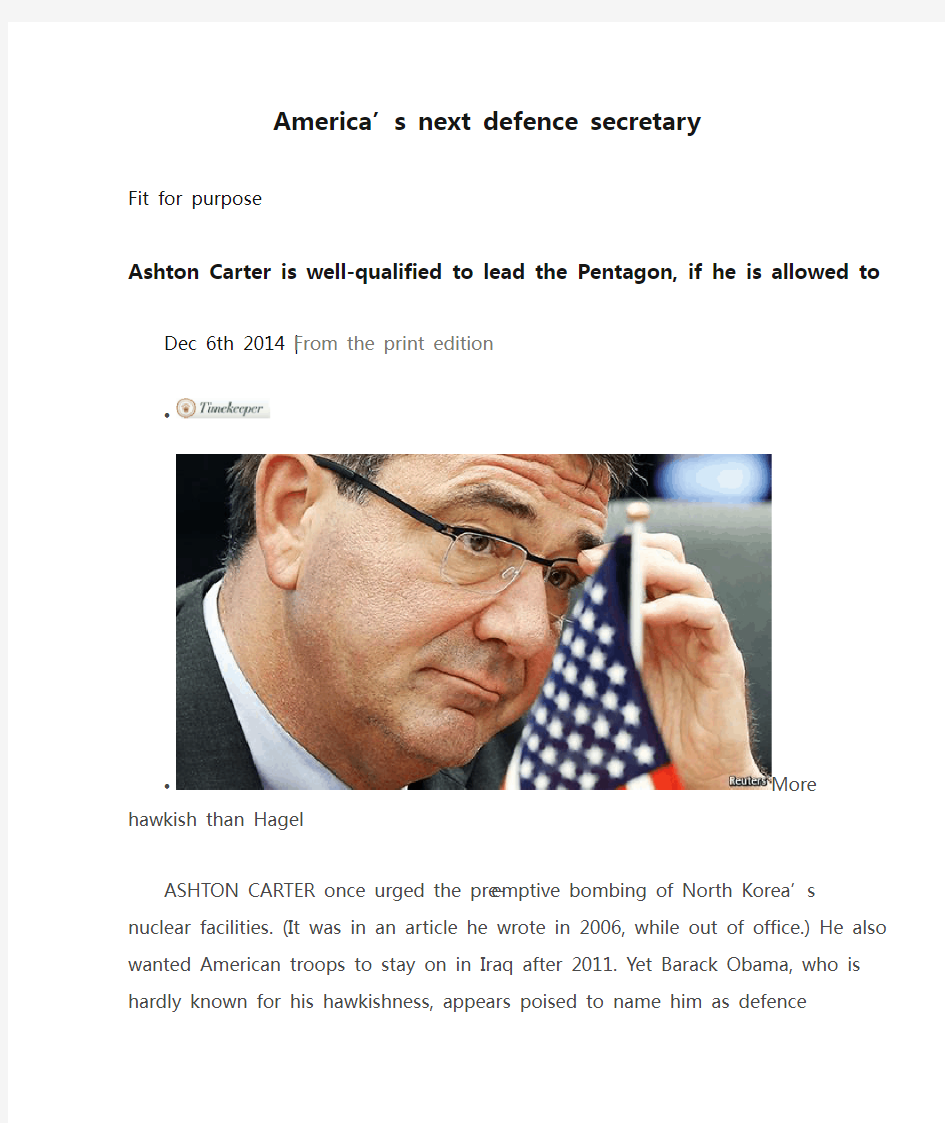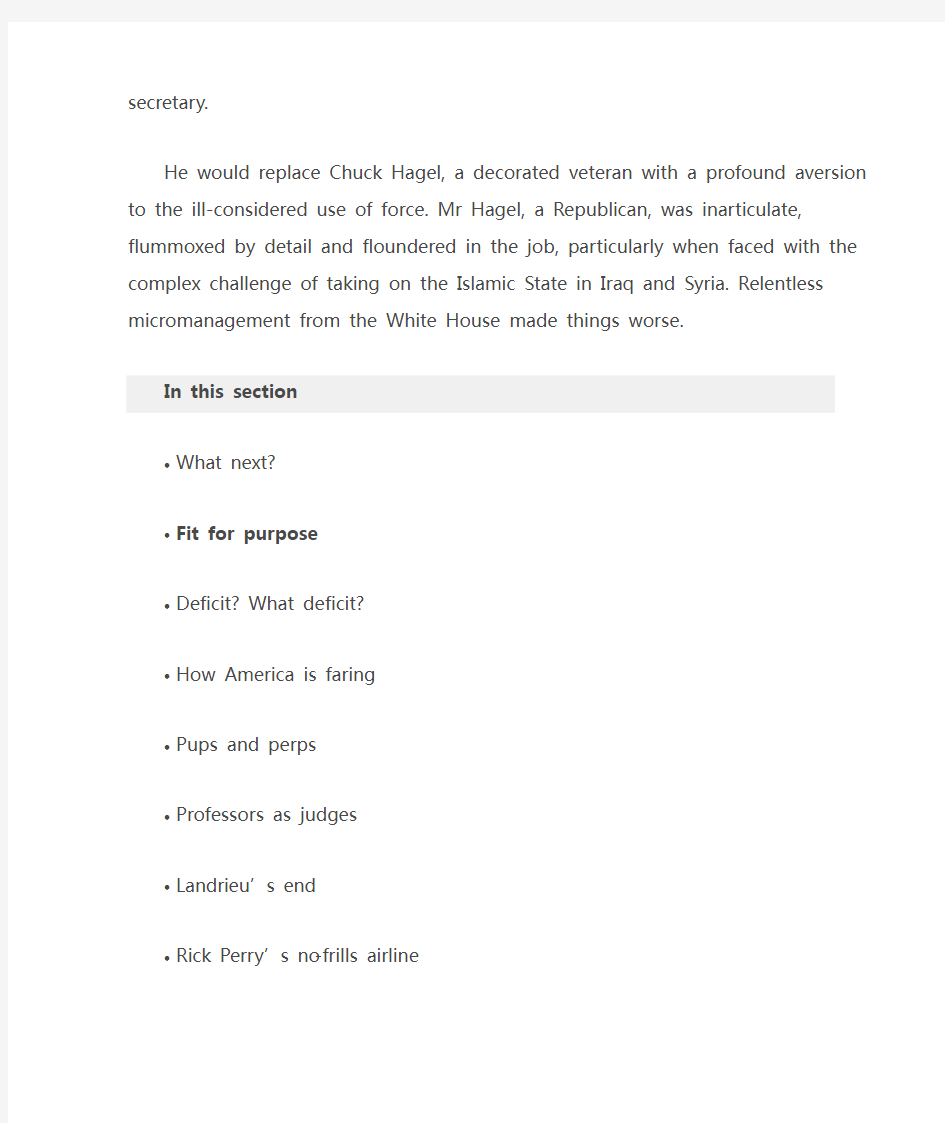

America’s next defence secretary
Fit for purpose
Ashton Carter is well-qualified to lead the Pentagon, if he is allowed to
Dec 6th 2014 | From the print edition
?
?
?
More hawkish than Hagel
ASHTON CARTER once urged the pre-emptive bombing of North Korea’s nuclear facilitie s. (It was in an article he wrote in 2006, while out of office.) He also wanted American troops to stay on in Iraq after 2011. Yet Barack Obama, who is hardly
known for his hawkishness, appears poised to name him as
defence secretary.
He would replace Chuck Hagel, a decorated veteran with a
profound aversion to the ill-considered use of force. Mr Hagel, a Republican, was inarticulate, flummoxed by detail and
floundered in the job, particularly when faced with the complex challenge of taking on the Islamic State in Iraq and Syria.
Relentless micromanagement from the White House made
things worse.
In this section
?What next?
?Fit for purpose
?Deficit? What deficit?
?How America is faring
?Pups and perps
?Professors as judges
?Landrieu’s end
?Rick Perry’s no-frills airline
?Clarification
Reprints
Related topics
?American politics
?World politics
?Chuck Hagel
?Barack Obama
?Politics
Insiders praise Mr Carter’s competence and experience. A
physicist by training, he was deputy defence secretary under
Leon Panetta, responsible for controlling a $600 billion annual budget. Such was his indispensability that Mr Obama asked him to continue in the job for a year after Mr Panetta left in 2013, to help Mr Hagel—an uncomfortable period for both men.
Before that, Mr Carter was the head of acquisitions,
restructuring the bloated Joint Strike Fighter (JSF) programme and cancelling costly under-performing or outdated programmes.
Soldiers in the field called him “the Deliverer”, for his ability to cut through the Pentagon’s copious red tape and get
urgently-needed kit to the front line, such as MRAPs
(mine-resistant ambush-protected vehicles) to shield troops from roadside bombs.
In Bill Clinton’s first administration, Mr Carter was in charge of America’s vast nuclear arsenal and led the effort to dismantle
and remove more than 8,000 nuclear weapons from states that had been part of the old Soviet Union. He also helped build security relationships with countries in eastern Europe that paved the way for them to join NATO.
Although some complain that Mr Carter’s intellectual
self-confidence and command of the most esoteric technical details can make him appear arrogant or aloof, his confirmation hearings on Capitol Hill should be much easier than the grilling Mr Hagel received. Both Mac Thornberry and John McCain, the Republicans who are about to take the helms of the House and Senate Armed Services Committees, are likely to see Mr Carter as an ally in reforming the Pentagon’s sclerotic procurement practices. Mr McCain, an arch-foe of wasteful defence spending, often clashed with Mr Carter over the JSF; yet he developed a grudging respect for him. Kori Schake, a former Bush administration security official now at the Hoover Institution, a think-tank, describes Mr Carter as “able, intelligent, effective and energetic”.
Mr Carter will need all those qualities and more if he is to make his mark over the next two years. He will want to forge a deal with Congress to bring more stability to the defence budget and
undo some of the cuts mandated under sequestration. Since the world looks scarier now than it did a year or two ago, the military budget ought perhaps to grow a bit. However, Todd Harrison of the Centre for Strategic and Budgetary Assessments in Washington reckons that the political compromises needed for a long-term fix are unlikely.
Mr Carter will also attempt to persuade Mr Obama and his ever-meddling team of advisers that some new thinking is needed to deal with the situation in Iraq and Syria. In particular, Mr Obama’s habit of deliberately constraining military options (for example, by ruling out the use of combat troops on the ground or, as in Afghanistan, setting timetables unrelated to conditions) makes the task of any defence secretary immeasurably harder.
For all his knowledge and experience of strategic issues, however, Mr Carter may still find himself excluded from real influence. Michael O’Hanlon of the Brookings Institution, a think-tank, says that when the decision was made to get rid of Mr Hagel, Mr Obama and his team on the National Security Council wanted someone personally close to the president who had worked his or her way up through their own ranks. To get a
hearing from this inner circle, says Mr O’Hanlon, Mr Carter will have to decide “how much china he’s prepared to break and how many political risks he’s prepared to take”.